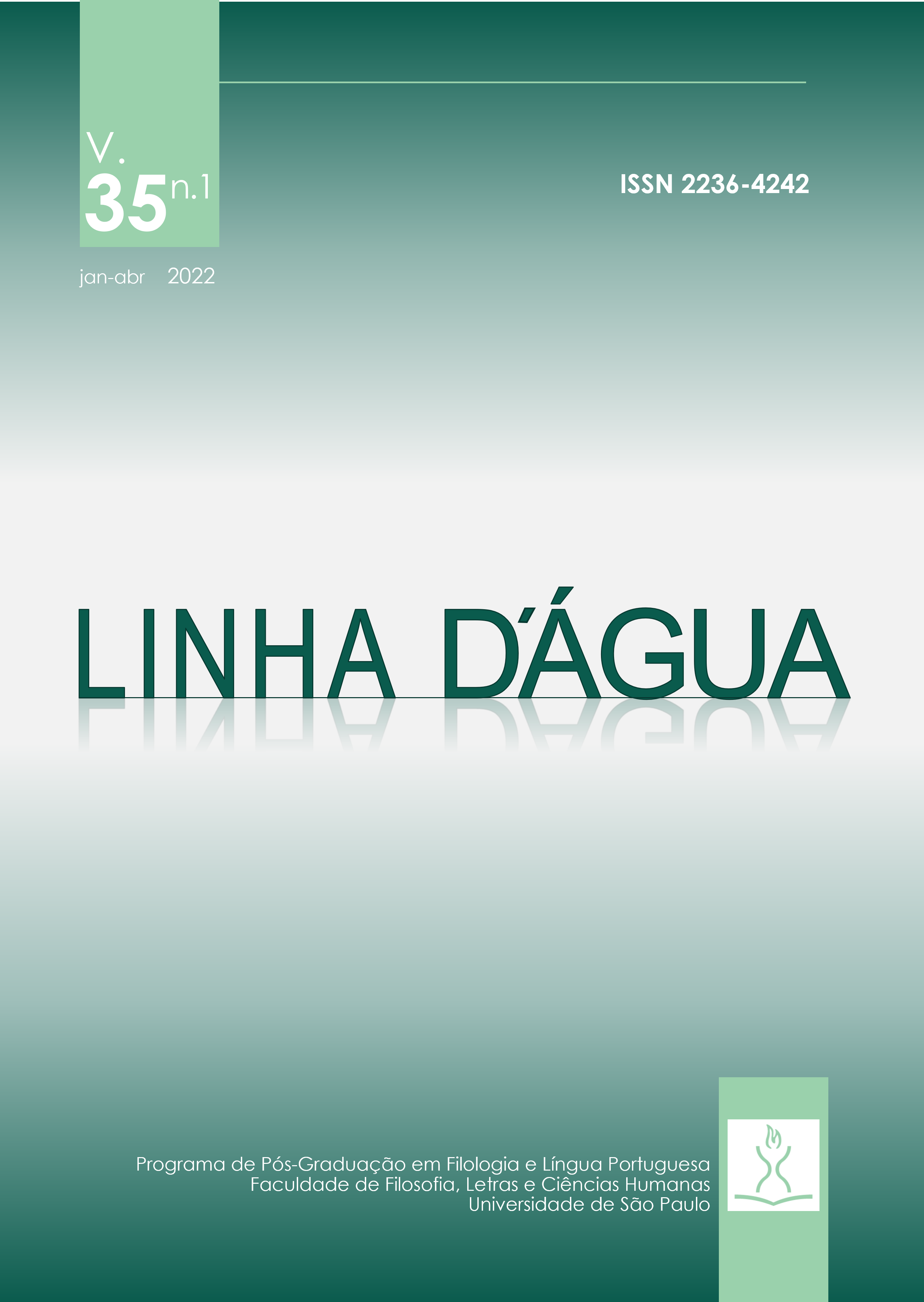Literary education and distance learning: a research report for an under-guidance community of readers
DOI:
https://doi.org/10.11606/issn.2236-4242.v35i1p157-179Keywords:
Literature, High school, Distance education, Reader development, Pedagogical practicesAbstract
This paper aims to describe and analyze two teaching practices concerning High School remote classes of Literature at Vargem Grande do Sul’s Technical School. In order to systematize reflections and theories regarding the practice of teaching, we drew on the works of Rilson Cosson, Cecilia Bajour, and Silvia Castrillón concerning the debate on reading and literature rights and the experiences of literary listening. In conclusion, we offer some evidence that teaching initiatives may have disrupted students’ perceptions related to school management and the adaptation of the state educational system to remote education in 2020.
Downloads
References
ASSIS, M. Papéis Avulsos. São Paulo: Escala Educacional, 2008.
BAJOUR, C. Ouvir nas entrelinhas: o valor da escuta nas práticas de leitura. Trad. de Alexandre Morales. São Paulo: Editora Pulo do Gato, 2012.
BENJAMIN, W. O conceito de crítica de arte no romantismo alemão. Trad. de Márcio Seligmann-SILVA. São Paulo: Editora Iluminuras, 2020.
CANDIDO, A. O direito à literatura. Vários escritos. 3. ed. São Paulo: Duas Cidades, 1995.
CASTRILLÓN, S. O direito de ler e de escrever. Trad. de Marcos Bagno. São Paulo: Editora Pulo do Gato, 2011.
CHBOSKY, S. As vantagens de ser invisível. Trad. de Ryta Vinagre. Rio de Janeiro: Editora Rocco, 2007.
COSSON, R. Círculos de leitura e letramento literário. São Paulo: Contexto, 2014.
CRUZ, A. Jalan jalan: uma leitura do mundo. Lisboa: Penguin Random House, 2017.
CRUZ, A. Vamos comprar um poeta. Porto Alegre: Editora Dublinense, 2019.
DI NAPOLI, P. N. Convivência virtualizada entre escolar e lar em tempos de pandemia: uma reflexão socioeducativa. Olhar de professor, v. 23, 2020. DOI: https://doi.org/10.5212/OlharProfr.v.23.2020.15510.209209225352.0521. Acesso em 7 de agosto de 2021.
ENDRUWEIT, M. Lendo os Clássicos em Voz Alta. Salão de Extensão (20, 2019: Porto Alegre, RS). Caderno de resumos. Porto Alegre: UFRGS/PROREXT, 2019. Disponível em: https://www.lume.ufrgs.br/handle/10183/215716. Acesso em 5 de agosto de 2021.
FREIRE, P. Pedagogia da autonomia: saberes necessários à prática educativa. Rio de Janeiro/São Paulo: Paz e Terra, 2015.
KONDER, L. As artes da palavra: elementos para uma poética marxista. Boitempo: São Paulo, 2005.
KRENAK, A. Ideias para adiar o fim do mundo. São Paulo: Companhia das Letras, 2019.
MANGUEL, A. O leitor como metáfora: o viajante, a torre e a traça. 1. ed. São Paulo: Edições Sesc, 2017.
MANGUEL, A. Ler é um ato de poder, 2018. 1 vídeo (5 min.). Publicado pelo canal Fronteiras do Pensamento. 2018. Disponível em: https://www.youtube.com/watch?v=XHBIAntmnhs. Acesso em: 24 mar. 2021.
MARUXO JUNIOR, J. H.; FARACO, C. E.; MOURA, F. M. Linguagem e Interação [3 volumes]. 3ºed. São Paulo: Editora Ática, 2016. Disponíveis em: https://www.edocente.com.br/pnld/2018/obra/lingua-portuguesa-linguagem-e-interacao/. Acesso em 24 mar. 2021.
PENNAC, D. Como um romance. Rio de Janeiro: Editora Rocco, 1993.
RIBEIRO, A. E. Tudo o que fingimos (não) saber sobre tecnologias e educação. Blog da Parábola Editorial, 2020. Disponível em: https://www.parabolablog.com.br/index.php/blogs/sobre-tecnologias-e-educacao. Acesso em 18 de março de 2021.
SANTOS, D. Prática docente em Língua Portuguesa no ensino médio: desafios, experimentações e o cotidiano das câmeras fechadas. H2D | Revista de Humanidades Digitais, 2(2), 2021. DOI: https://doi.org/10.21814/h2d.2894.
SCHLEGEL, F. Conversa sobre poesia e outros fragmentos. Trad. de Victor-Pierre Stirnimann. São Paulo: Editora Iluminuras, 1994.
SUASSUNA, A. Auto da Compadecida. Rio de Janeiro: Editora Nova Fronteira, 2018.
TRUJILLO, C. S. A.; PINTO, N. S. A roda literária como uma proposta para a formação de leitores literários no projeto de extensão “Fragata: itinerâncias literárias”. Revista Cadernos da Educação Básica, v. 5, n. 1, 2020.
Downloads
Published
Issue
Section
License
Copyright (c) 2022 Daniel dos Santos, Drisana de Moraes

This work is licensed under a Creative Commons Attribution-NonCommercial 4.0 International License.
The Editorial Board authorizes free access to and distribution of published contentes, provided that the source is cited, that is, granding credit to the authors and Linha D'Água and preserving the full text. The author is allowed to place the final version (postprint / editor’s PDF) in an institutional/thematic repositor or personal page (site, blog), immediately after publication, provided that it is available for open access and comes without any embargo period. Full reference should be made to the first publication in Linha D'Água. Access to the paper should at least be aligned with the access the journal offers.
As a legal entity, the University of São Paulo at Ribeirão Preto School of Philosophy, Sciences and Languages owns and holds the copyright deriving from the publication. To use the papers, Paidéia adopts the Creative Commons Licence, CC BY-NC non-commercial attribution. This licence permits access, download, print, share, reuse and distribution of papers, provided that this is for non-commercial use and that the source is cited, giving due authorship credit to Linha D'Água. In these cases, neither authors nor editors need any permission.
Partial reproduction of other publications
Citations of more than 500 words, reproductions of one or more figures, tables or other illustrions should be accompanied by written permission from the copyright owner of the original work with a view to reproduction in Linha D'Água. This permission has to be addressed to the author of the submitted manuscript. Secondarily obtained rights will not be transferred under any circumstance.










